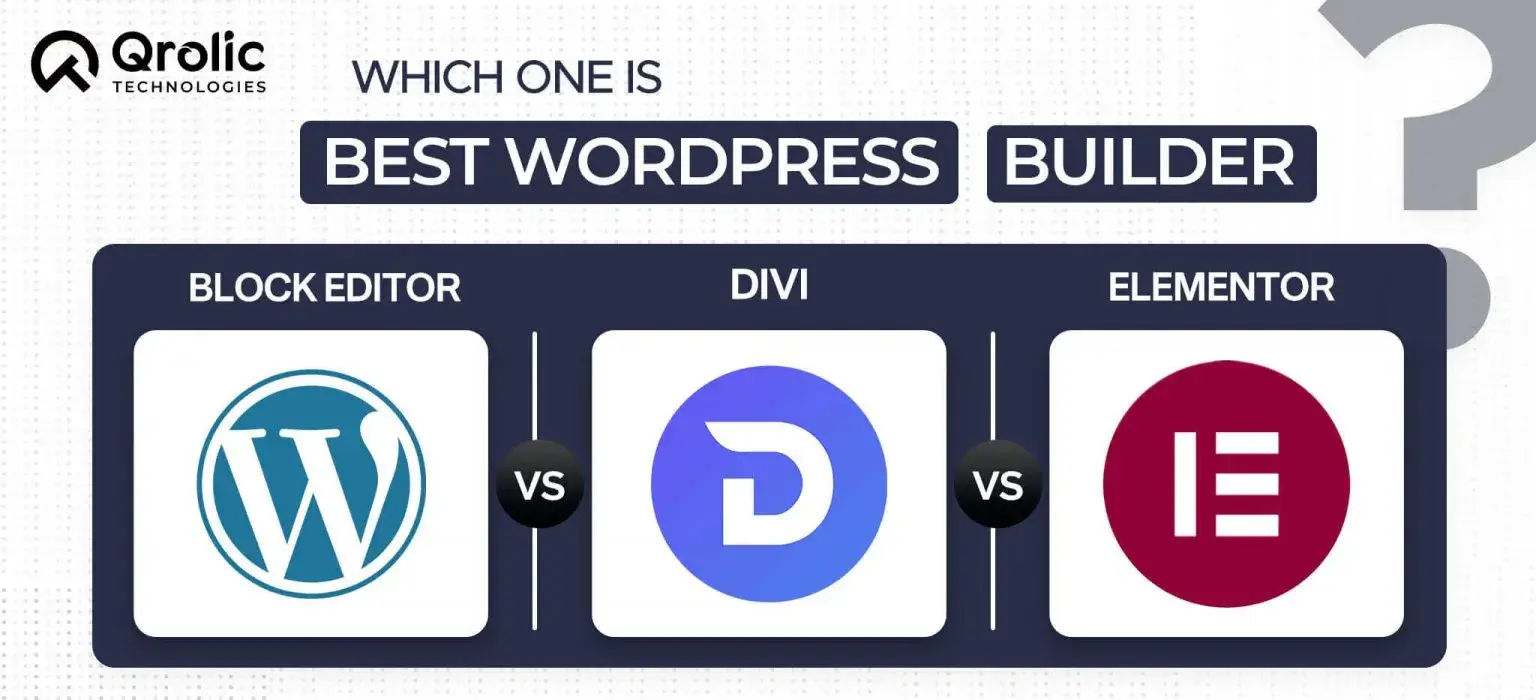A few years back website creation demanded a lot of technical knowledge and proficiency in HTML, CSS, and JavaScript. The scenario has changed, building a user-friendly website with no code is possible. Today, a variety of user-friendly website builders empower anyone to build a website with no coding required.
This article delves into three prominent website builders within the WordPress ecosystem: Block Editor, Divi, and Elementor, exploring their features, advantages, and potential drawbacks.
Let’s begin with learning about these 3 platforms.
Table of Contents
- WordPress:
- Divi:
- Elementor:
- Explore front-end editing with Block Editor, Divi, and Elementor:
- Benefits of Block Editor, Divi, and Elementor:
- → Perks of using Block Editor
- → Perks of using Divi
- → Perks of using Elementor
- Limitations of Block Editor, Divi and Elementor
- → Limitations of Block Editor
- → Limitations of Divi
- → Limitations of using Elementor
- Editor Use Cases
- Companies using these platforms:
- Other points to consider before making the decision:
- Costs:
- Learning Curve:
- Integrations:
- Support:
- The final thoughts:
WordPress:
Block Editor (Gutenberg) is a website builder that replaced the Classic Editor that was previously used on WordPress. Unlike the Classic Editor, the Block Editor uses blocks, which provides an intuitive and versatile approach to design and structure websites of different types.
Divi:
Divi is another site-building tool that works on WordPress and other content management systems (CMS). It offers features and options for building website pages and selecting themes through customizations, drag-and-drop functionality, and existing site layouts.
Elementor:
Elementor joins the ranks of popular website builders, empowering users to create and edit websites through a front-end editor. This intuitive interface provides a real-time visual representation of any changes made, eliminating the need to switch back and forth between editing and preview modes. Furthermore, elementor boasts a comprehensive library of pre-built widgets, offering a diverse range of functionalities that can be effortlessly integrated into your website design. Finally, Elementor ensures your website adapts seamlessly across various screen sizes with its responsive design interface, guaranteeing a positive user experience on all devices.
Now that we’ve explored these three platforms, let’s delve into their front-end editing capabilities.
Explore front-end editing with Block Editor, Divi, and Elementor:
All of them offer an easy front-end editing option, along with some unique experience and add-on features. Below mentioned are some standout features of each tool.
Block Editor: The Block Editor offers a user-friendly drag-and-drop interface. Think of website creation with pre-built blocks for text, images, and galleries – ideal for beginners seeking a streamlined experience.
Divi (Premium): Divi empowers extensive design control with its drag-and-drop interface and a vast library of pre-made layouts. While powerful, its reliance on pre-built elements might limit truly unique website design.
Elementor (Free): Elementor integrates with the Block Editor, offering a visual editor packed with widgets and design features and allows a real-time website building and editing outlook. Striking a balance between user-friendliness and customization, Elementor is a popular choice for all experience levels.
Here we talked about front-end editing, there are more benefits to each of these platforms. Let’s learn about them.
Benefits of Block Editor, Divi, and Elementor:
Let’s begin with understanding the benefits of Block Editor:
→ Perks of using Block Editor
Due to its integration with WordPress, anyone can create responsive websites using the Block Editor without creating any code, making this tool suitable for use by beginners. Other benefits of a block editor include:
- Excellent HTML 5 Outcome;
- Reusable blocks;
- Seamless interaction with plugins;
- Integration with Gutenberg templates.
→ Perks of using Divi
Divi is simple to use, which makes it suitable for non-programmers. Some reasons to use this tool include:
- Customization options;
- Theme options;
- Pre-design layouts;
- Portability.
→ Perks of using Elementor
With its live editing feature, Elementor lets users create and edit websites interactively. Other Elementor benefits include:
- Access to a popup builder;
- Seamless third-party integration;
- Custom CSS option;
- Extensive widgets.
Just as every coin has two sides, along with benefits each of these platforms has limitations too.
Limitations of Block Editor, Divi and Elementor
Although each of these tools has several benefits, there are some challenges you may face when using any of these solutions.
→ Limitations of Block Editor
Block Editor users may face some challenges, including:
- Design Limitations: Block Editor offers users limited design options and flexibility, making it challenging to create or update complex websites.
- Customization Difficulties: In addition, customizing new and existing sites can be problematic as navigating and using designs and layouts can be complex for users with no coding knowledge.
→ Limitations of Divi
Some difficulties associated with using Divi include the following:
- Challenging to Learn: Despite being user-friendly the technical side of Divi, makes it challenging for users to adopt this tool, especially for those who have no technical background.
- Theme Dependency: Compatibility issues can make transitioning from one theme to another challenging on Divi.
→ Limitations of using Elementor
Be sure to consider the following challenges when using Elementor:
- Template Limitations: Despite the large widget library, Elementor has a constricted template option.
- Elementor: Elementor offers a real-time website editing option, making it suitable for creating websites using widgets and templates.
As we have discussed the limitations, we should also gather knowledge about use cases, especially from the editor’s point of view. Without having a detailed knowledge about use cases, it is not possible to take maximum benefit of either of these platforms.
Editor Use Cases
Between the Block Editor, Divi, and Elementor, each solution can help you build any website type. However, you can best use each tool as follows.
- Block Editor: Ideal for creating or managing content-based blogs and websites that require less focus on intricate design aesthetics.
- Divi: Prefer using Divi if you want to create sites using different options, including customization features and pre-built website layouts.
- Elementor: Elementor offers a real-time website editing option, making it suitable for creating websites using widgets and templates.
Companies using these platforms:
Since these platforms are famous, a lot of brands/companies are already using them.
Block Editor: The Next Web, BBC America, Wikipedia
Divi: Elegant Themes
Elementor: FedEx, UNICEF, Ahrefs
Other points to consider before making the decision:
Costs:
- Block Editor: Free (included with WordPress)
- Divi: Premium plugin with a one-time fee. Offers a lifetime license with updates included.
- Elementor: Free version with limited features (e.g., fewer widgets and templates). Pro version unlocks more features and functionalities with tiered pricing plans.
Learning Curve:
- Block Editor: Beginner-friendly. A person with no coding experience can use it. Drag-and-drop interface with intuitive functionalities.
- Divi: Moderate learning curve. While the drag-and-drop builder is user-friendly, the extensive customization options might require exploring tutorials or documentation to unlock its full potential.
- Elementor: Moderate learning curve. The real-time editor is intuitive, but exploring the vast widget library and advanced features might benefit from exploring online resources.
Integrations:
- Block Editor: Integrates quickly and seamlessly with all WordPress plugins, offering maximum flexibility and functionality and works without a glitch.
- Divi: Integrates with a few of the popular WordPress plugins, but compatibility issues might arise with less common plugins or less used plugins.
- Elementor: Integrates easily and well with many third-party plugins, but some functionalities might require using Elementor Pro add-ons for specific plugins.
Support:
- Block Editor: Leverages the vast WordPress community for support. Extensive online resources, forums, and tutorials are readily available.
- Divi: Offers dedicated support through Elegant Themes, the plugin developer. Paid Divi users have access to priority support channels.
- Elementor: The free version offers limited support through the WordPress forums. Elementor Pro users have access to priority email and ticket-based support.
The final thoughts:
Choosing the right website builder can feel overwhelming! Block Editor, Divi, and Elementor all offer strong options within WordPress.
Block Editor is fantastic for beginners with its drag-and-drop interface, while Divi boasts ultimate design control. Elementor strikes a perfect balance, offering real-time editing and a vast widget library. Consider your experience. coding expertise, website requirements, and preferences to pick your perfect website-building partner!









